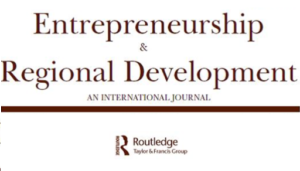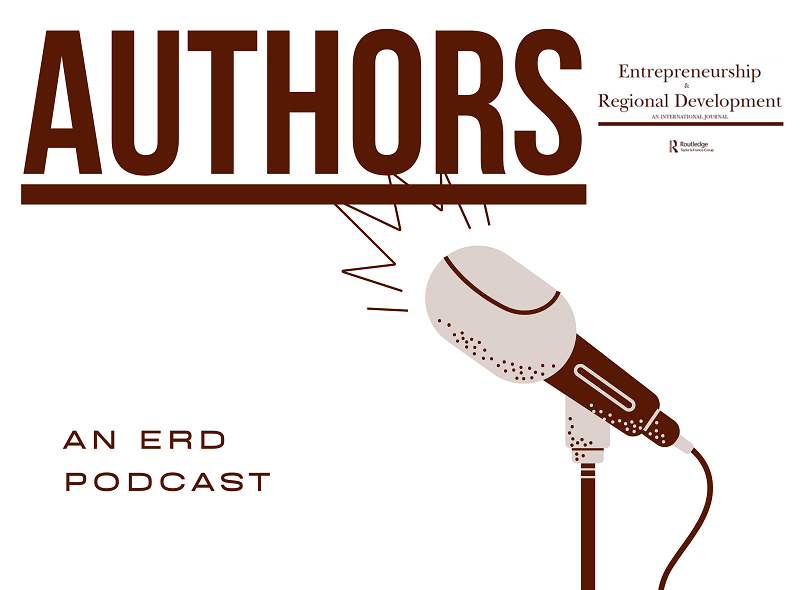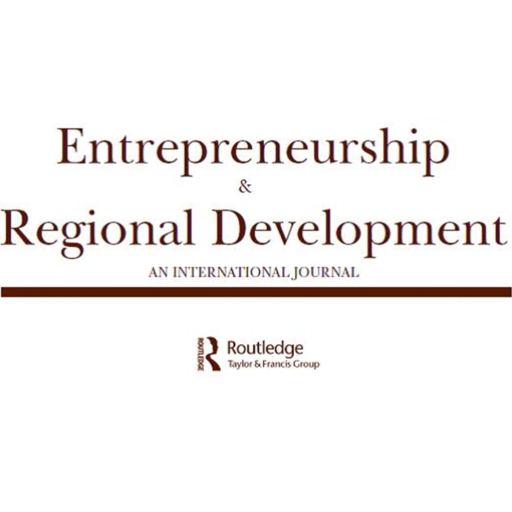Episode 72 – Ana Maria Bojica – Framing conflicting demands and strategies for managing hybridity in social enterprises
Transcription of the interview
Automatic transcritption.
Welcome to the Entrepreneurship & Regional Development Podcast.
Each publication in our Journal is a great opportunity to share significant and audacious contributions to a large audience.
My guest today is Anna Maria Bojica.
She recently published an article entitled Framing Conflicting Demands and Strategies for managing hybridity in social enterprises.
She published this article in entrepreneurship and regional development, a journal edited by Taylor and Francis.
She co-authored this paper with Javier Martinez Del-Rio.
Ana, welcome to our podcast.
Ana
Thank you very much for having me.
LEFEBVRE Vincent
Can you tell us what is the origin of your paper?
Why have you decided to address this particular topic and what is the question you want to answer?
Ana
Yes, of course.
The the origin of this paper lies in in my coauthor interest and my own interest in in social enterprises hybrid organizations.
We have always found intriguing and talked a lot about the complexity surrounding surrounding making decisions in situations of conflicting prescriptions.
This is the primary focus of most previous literature literature on social enterprises, and it is what sparked our interest in this topic.
But at the same time, I have been teaching social entrepreneurship for the past ten years, and when I invited social entrepreneurs and managers of social enterprises as guest speakers in my courses or met them with different events, I observed that some of them talked about these projects as a continuous struggle emphasizing conflict.
The same conflict that that literature talked about, but others did not emphasize tensions regarding the management of economic and social dimensions.
Therefore, we we wanted to delve into why executives take such different approaches to the management of social enterprises.
So we could say that the origin was a gap between the observed phenomenon and academic literature.
LEFEBVRE Vincent
What are the main contributions of your paper?
Ana
We identified 3 main contributions.
First, we introduce cognitive frames in the literature and social enterprises as an important explanatory factor for the heterogeneous responses that social enterprises give to the tensions arising from their hybrid mission.
We identified 2 managerial cognitive frames.
The balancing and the integrative and describe them.
The balancing involves the assumption that simultaneously pursuing social and economic goals is paradoxical, and it’s problematic.
For example, the words and expressions used by those managers with the balancing frame when talking about the mission of the enterprise include tension difficult 1000 contradictions, thousands of adjustments every day.
These are hard.
Lots of conflicts.
Headache.
This is always the bone of contention.
It is all.
It isn’t always understood, so I would like to emphasize something that we consider very important here.
This is a paradoxical frame, and it is paradoxical because.
The paradoxes are not addressed by leaning towards one or another of the goals.
Instead, these managers seek to achieve balance by making adjustments and compromises in both respects.
So we could say that they take a win, lose approach to this paradoxes impacting both on the economic and social domains.
On the other side, the integrity frame we identified involved that the tensions are rising from the hybrid condition of the enterprise, are not perceived as negative.
They are seen as a differential attribute that is fundamental and inherent to the film is existence.
Uh, the semantic field, for example, revolving around the integrative frame, includes very different words from those identified in the balancing frame.
For example, here they permanently, they refer to the dual logic dual prism dual work dual component or they said more than clashing.
It’s getting people to understand there is no social mission without management and I remember very well on an interview with one of these managers saying otherwise, we wouldn’t be who we are.
We’d be another type of organization that says a lot about us, so we could say that the integrity frame presents a win win approach.
The hybrid condition of of social enterprises.
The second contribution is that we also identify and describe various strategies that social enterprises use to manage their social and market activities.
We label these strategies hybrid strategies and according to their content, we group them into categories that defensive and exploratory.
The defensive strategies involve refusal to grow and important limitations in the scope of the market and social activities.
The exploratory strategies involved innovation both in products and in the social insertion programs.
Market growth and market growth was seen as a mean for creating more insertion opportunities and growing their social impact.
Because I don’t know if I mentioned before, but the type of social enterprise that we, we focus our analysis on is that of work, integration, social enterprises.
This is why the social mission here is in the social impact lies in creating insertion opportunities for.
People that are at risk of social exclusion, a third we also identify the mechanism through which cognitive frames shapes strategy and this mechanism are the representation of the environment, the representation of agency and the capability to integrate conflicting prescriptions.
So to put it more simply, our findings show that managers who adopt the balancing cognitive frame tend to perceive the environment as threatening believe the enterprise has limited capacity for agency and self imposed limits on the ability to combine market and social goals.
In turn, uh, these perceptions of adversity are associated with defensive responses, which lead the company to adopt strategy to preserve the status quo.
And this involves alternatively compromising on both social and market activities.
These compromises limit the scope of films activities, but ensure that it remains sustainable in the long run.
On the other side, those adopting an an integrative cognitive frame.
And I have morning haze perceptions of opportunities and there are angentic capability.
And this enables them to identify synergetic alternatives.
Our findings suggest that these factors drive working integration social enterprises to adopt more proactive and exploratory strategies.
And is an additional contribution to this three main that I that I mentioned?
I would like to emphasize that while most previous research in social enterprises assumes intractable conflict between dual goals and the means employed to achieve them, we find that managers also take synergistic approaches to the social and economic domains when they adopt integrative cognitive frames.
And release through this frames the tensions associated with their dual condition.
So this is also related to to it’s it’s a response to our initial research question.
LEFEBVRE Vincent
What was for you the the main theoretical or maybe methodological challenge of challenges in addressing such a question?
Ana
Oh yes, the both. My girlfriend.
Myself are quantitative researchers.
It was a great challenge to adopt the different mindset when approaching the research question and developing the analysis, but we have no doubt that this was the adequate approach to respond to our research question.
So we we went for it in terms of theory, we have different theoretical perspectives and several of them were relevant to approach our research question.
For example, the institutional logics perspective, the paradox management perspective sense making.
But we couldn’t talk to all of them.
We have to focus umm, we are used to start with.
Theory is quantity quantitative researchers, but this was an inductive research, so theory came with the back end with with more prominence in the review process.
We have to say that that reviewers and the editor were very helpful and we are very grateful for that, orienting us to focus on our data analysis and then discuss our results in relation to theory and this narrowed down the focus to the perspective to each our study contributed the most and it was very helpful.
LEFEBVRE Vincent
During your research journey, what was the biggest surprise or the most concerning creative result?
Ana
I guess that’s some social enterprises had a truly entrepreneurial and innovative discourse very far from the portrait of struggling films that the literature draws most of the time of them, particularly of the social enterprises.
Uh, that we analyze in our in our study, which are working integration, social enterprises and in addition I would like to mention something that was not necessarily surprising, but it was really inspiring and this the passion and and commitment that people that we interviewed put into what they do.
It was a way of living.
Full dedication.
LEFEBVRE Vincent
What are the main implications of your work for entrepreneurs, managers, policymakers, practitioners in general?
Ana
I I would say that we have two main implications.
One is creating awareness of the cognitive frames employed in the understanding of the company’s mission.
Because this cognitive frames may introduce some biases in the understanding and therefore in the choices this managers make, so becoming aware of this at this cognitive frames and the potential biases they might introduce, maybe helpful in terms of.
Developing different strategies that wouldn’t come at 1st and UM.
The second implication would be.
The mapping of the different types of hybrid strategies, what actually what we do when we map the defensive and exploratory strategies is that we develop an inventory of strategies that can inspire and help entrepreneurs and executives of social enterprises manage the inclusivity oriented tests and also the growth economic growth of the organization.
LEFEBVRE Vincent
Thanks a lot Ana for participating to our show and presenting your paper entitled Framing of Conflicting demands and Strategies for managing hybridity in social enterprises.
All our podcasts are available on entrepreneurship-erd.com and other main podcasts platforms.
Research has shown that social enterprises must constantly balance conflicting demands between their social and economic goals. However, little is known about the factors that shape managers’ strategic choices in response to the tensions associated with social enterprises’ hybrid nature. To address this issue, we conducted a case study analysis of six work integration social enterprises that draws on insights from previous literature on organizational hybrids and managerial frames. This study identifies two distinct cognitive frames that managers adopt to interpret the hybrid condition of their organization, balancing and integrative, each of which is associated with different types of strategies for managing hybridity, defensive and exploratory, respectively. Additionally, we unveil the mechanisms through which these frames shape hybrid strategies, namely, through the representation of the environment, representation of agency, and capability to integrate conflicting prescriptions. These results underscore the individual agency of managers and their idiosyncratic cognitive processes as important explanatory factors for the wide array of strategic responses observed in the management of social enterprises.


